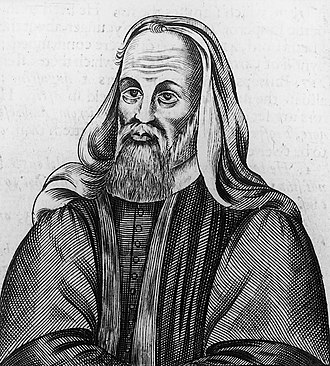Pelagius
| Advanced search |
- About 6 results found and you can help!
 A 17th century Calvinist print depicting Pelagius. The caption says: "Accurst Pelagius, with what false pretence Durst thou excuse Man's foul Concupiscence, Or cry down Sin Originall, or that The Love of GOD did Man predestinate." |
Pelagius (ca. AD 354 – ca. AD 420/440) was an ascetic who opposed the idea of predestination and asserted a strong version of the doctrine of free will. He was accused by Augustine of Hippo and others of denying the need for divine aid in performing good works. None of his own writings survive. According to his opponents he advocated that the only grace necessary was the declaration of the law; humans were not wounded by Adam's sin and were perfectly able to fulfill the law apart from any divine aid. He denied the more specific doctrine of original sin as developed by Augustine. Pelagius was declared a heretic by the Council of Carthage. His interpretation of a doctrine of free will became known as Pelagianism. He was well educated, fluent in both Greek and Latin, and learned in theology. He spent time as an ascetic, focusing on practical asceticism, which his teachings clearly reflect. He was certainly well known in Rome, both for the harsh asceticism of his public life as well as the power and persuasiveness of his speech. His reputation in Rome earned him praise early in his career even from such pillars of the Church as Augustine, who referred to him as a "saintly man." However, he was later accused of lying about his own teachings in order to avoid public condemnation. Most of his later life was spent defending his doctrine against Catholic theologians who held that Catholicism came from the apostles and that Pelagius was spreading novelties in the Faith unknown to the apostolic tradition.
- Related: Pelagianism, Semipelagianism, Caelestius, Julian of Eclanum, Manichaeism, Celtic Christianity
| Pelagius & the Pelagians: What they really taught ... Pelagius & the Pelagians: What they really taught and believed www.libraryoftheology.com/pelagianismwritings.html - Web |
| Transcript From The Council of Diospolis (Lydda) A... Transcript From The Council of Diospolis (Lydda) Against Pelagius, 415AD www.seanmultimedia.com/Pie_Pelagius_Synod_Lydda_415AD.html - Web |
| Canons From The Council Of Carthage Against Pelagi... Canons From The Council Of Carthage Against Pelagianism, May 1, 418 www.seanmultimedia.com/Pie_Council_Of_Carthage_May_1_418.html - Web |
Average relevance
| Pohle, Joseph. Pelagius and Pelagianism. In... Pohle, Joseph. Pelagius and Pelagianism. In The Catholic Encyclopedia, Volume XI www.newadvent.org/cathen/11604a.htm - Web |
| Pierce, Peter. The Pelagius Book. The Age. ... Pierce, Peter. The Pelagius Book. The Age. June 11, 2005. Melbourne: Fairfax Digital. www.theage.com.au/.../1118347580857.html - Web |
| Deacon Geoffrey Ó Riada. Pelagius: To Demet... Deacon Geoffrey Ó Riada. Pelagius: To Demetrias. An analysis of the letter and a brief biography. www.brojed.org/pelagius.html - Web |